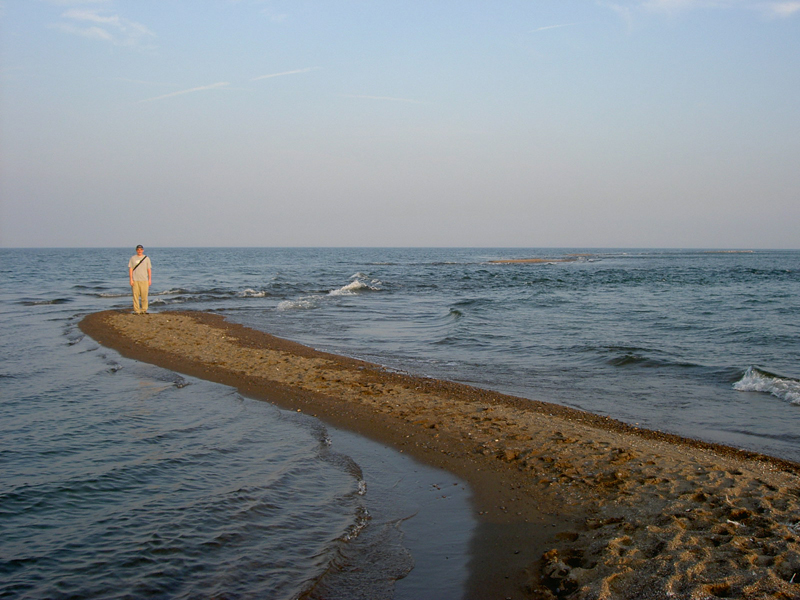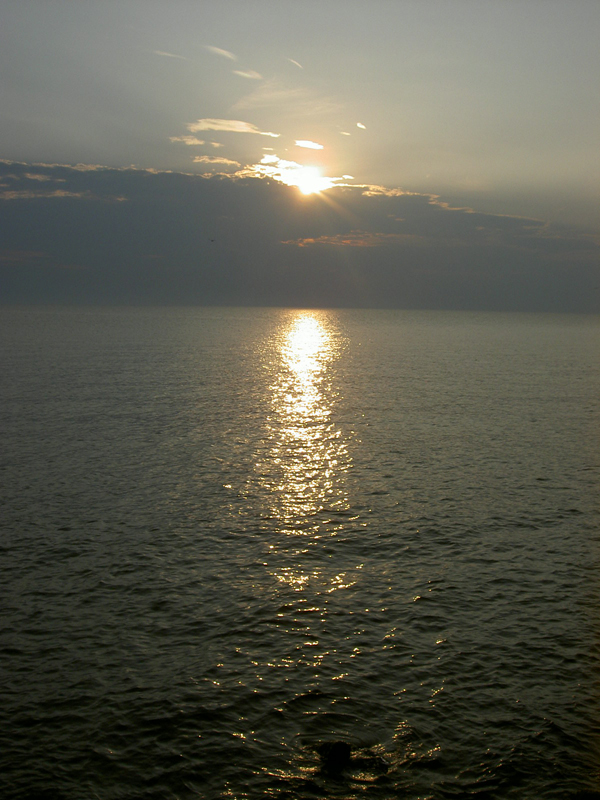But whenever I’m honest, something in me / still looks for fresh water that feels like the sea. — Carrie Newcomer

standing on the southernmost tip of Canada
When I was a kid, I used to go to the beach at Point Pelée nearly every summer with my grandparents. I didn’t swim in the ocean until I was in high school, and to this day I sputter with the saltiness when I first go in. For me, as a kid, large bodies of water were Lake Erie and Lake Michigan. I couldn’t swim to the other side, and there weren’t sharks; that was all I needed to know. Only within the past couple of years have I been in Lake Huron, thanks to the hospitality of a friend with a family home up north, but I hope to eventually swim in all five.
I didn’t realize, until I moved out East, how much my sense of myself was defined by growing up around those lakes. When people out here hear ‘Midwest’ they think Idaho, Nebraska, Kansas. While I’m sure those places are nice, I think Michigan, Indiana, Ohio. Now, when people ask me where I’m from, I say the Great Lakes region.
My trip back to Point Pelée this summer was motivated somewhat by nostalgia, and a desire to share one of the favorite places of my childhood with my partner, and somewhat by an adult understanding of the significance of the park as a wildlife refuge. Along the lines of nostalgia, we went the whole nine yards: changing outside in the doorless spider-laden ‘rooms’, with one of us holding up the towel to block the other from view; dashing into the water to avoid the black flies, which weren’t so bad due to the drought, all the while yelling out ‘ooh! ouch! my feet! the stones! watch out for that dead thing!’; and, finally, bobbing from cold current to warm current back to cold current again, with exclamations of ‘did you pee or is that pollution?’ all the while. Following on the reminiscing I shared with a fellow bed and breakfast guest regarding the prevalence of dead fish on the beach during our youth, and how they never phased us and we just picked them up and threw them at each other, I told my partner we could get out when he saw a dead fish float by. Since that didn’t seem likely to happen anytime soon, we instead got out when we noticed that we were the only ones in the water and I conceded that I had, in fact, neglected to check the water safety posting at the Visitors’ Centre, a revelation that sparked cries of ‘my skin is burning, my skin is burning!’ from my faithful companion. Thankfully, a couple of families arrived as we were leaving, saving me from further castigation. Once we were safely back in the car, muddy feet and all, he turned to me and said, ‘This was your childhood beach-going experience? I’m so sorry.’ People from ocean states just don’t understand, although I did assure him that there are in fact sandy beaches with clean water in the Great Lakes system, we just didn’t happen to be near any of them.
Childhood nostalgia thus dispensed with, as well as could be with only being able to make the smaller loop of the marsh boardwalk, we moved onto the adult attractions of the place. Namely, the walk to the Point and the sighting of bazillions of birds. Most of the birds were ones I’d seen before, but I did add a new lifer, Bonaparte’s Gull. In addition to that treat, we saw several birds I’d only seen a few times before, including a Cuckoo and a clearly identified Swamp Sparrow. I missed the sight of a Red-Headed Woodpecker, flying along the golf course as we drove into the park, which would have been a new life bird for me; my bemoaning of this fact led my partner to say over and over ‘I wish I’d never seen that !@#$% bird!’ Mostly what we saw were barn swallows—in the nests, newly fledged, gathering food for each other—herons, and kingbirds. We also saw a pair of yellow warblers that were annoyingly difficult to identify. Their consistent bright yellowness led us to conclude, with some reliance on the frequency chart purchased at the Visitors’ Centre, that they were likely simply Yellow Warblers, but we were never able to catch sight of any definitive markings, despite our best efforts. It all comes of being novices, I suppose.
The Point itself was fun. I didn’t remember being down there as a kid, and it was pretty thrilling to walk along a narrow strip of land until your feet were surrounded on all three sides by lapping waves. The nerdy aspect of standing on the southernmost tip of Canada was not lost on us either. We stayed to enjoy the sunset of the western side of the Point, and then drove back to Windsor.
